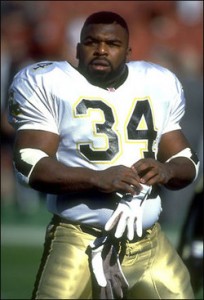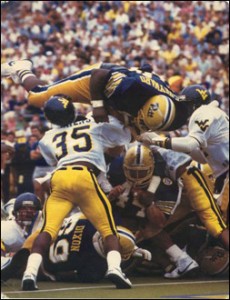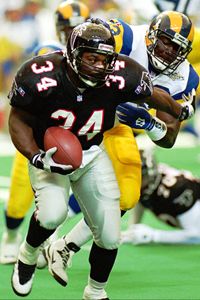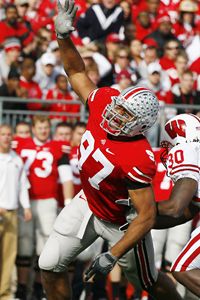Craig Heyward: A Man Called “Ironhead”

Craig "Ironhead" Heyward began his NFL career as a first round draft pick of the New Orleans Saints in 1988.
Writer’s Note: Craig Heyward would have been 45 on Sept. 26, 2011.
The name “Ironhead” Heyward used to invoke fear into the hearts of NFL defenders. Hell, Heyward used to invoke fear into the hearts of anyone who crossed his path, or him. This is how Len Pasquarelli from ESPN.com described Heyward:
“He was one of the toughest, nastiest SOBs that I have encountered in 28 years of covering the NFL, a man whose menacing scowl could seemingly strip paint from a wall, and who reveled in his own brute physicality and took glee from imposing his strength on others.”
But is that really all Craig “Ironhead” Heyward was about?
There is no doubt that Heyward relished the moniker he had been given at New Jersey’s Passaic High School (the same high school, incidentally, whose halls had been previously haunted by Jack “Call Me Assassin” Tatum).
Whether it was because of his eight-and-three-quarter-inch hat size or his propensity for using his head as a battering ram, it cannot be disputed that Heyward loved to spread the gospel of his “Ironhead.”

Heyward gained 3,086 yards in three seasons at Pitt.
The 5’11” Heyward played at anywhere from 265-280 pounds, using his girth, power, and agility to overpower defenders while playing for the University of Pittsburgh (Pitt).
Heyward was deceptively fast and once challenged one of the Panthers’ wide receivers to a race in the 100-yard dash. Heyward accumulated such a lead that he turned around and ran the last five yards backwards!
For a big man, he could bust a move. One of his less famous nicknames was “The Fred Astaire of Football.”
In Pitt’s 1987 opener against BYU, Ironhead rushed for 133 yards, had two receptions for 66 yards, and threw a pass for a 17-yard touchdown, leading the Panthers to a 27-17 victory.
Once, on a screen pass, Heyward sprinted 40 yards down the sideline and leaped over a defensive back in the process. He later said he learned that move from Michael Jordan and labeled himself, “Air Iron.”
That first game was an early indicator of what kind of season Heyward would have. He rushed for 1,655 yards, had over 100 yards rushing in every regular season game, earned first-team AP All-America honors, and was a finalist for the Heisman Trophy.
For his three-year career at Pitt, Heyward amassed 3,086 yards, good for third on Pitt’s all-time rushing list. He trails only Tony Dorsett (6,082) and Curvin Richards (3,192).
Then in a move which was deemed risky at the time and frowned upon by the NCAA, the NFL, and Pitt head football coach Mike Gottfried, Heyward announced he would not be returning for his senior year and would be declaring, as a junior, for the NFL draft.
At the time, the NFL had an arrangement with the NCAA that stated if a player still had eligibility left (Heyward had red-shirted as a sophomore), the player could not enter the NFL draft.
Gottried sent letters to Tex Schramm, Paul Brown, and Bill Walsh—all members of the competition committee—imploring them to keep Heyward out of the draft.
In the end, the NFL recanted, and both Heyward and Trevor Molini, the former Brigham Young University tight end, were granted eligibility for the NFL.
Letting his weight balloon to well over 300 pounds, Heyward was predicted to be drafted somewhere around the third round in the 1988 draft.
In one of many battles with his weight, Heyward hired a trainer and whipped himself into the best shape of his life and slimmed down to a svelte 250 pounds.
The New Orleans Saints subsequently drafted him as the 24th selection in the first round of the 1988 draft, embarking him on an eleven-year journey in the NFL.
Heyward would spend the first part of his career with the Saints, and then make stops with the Bears, Falcons, Rams, and Colts.
Although he was a decent running back, Heyward would not realize the same success in the NFL as he had in college as a rusher. He did, however, become known as a fierce blocker.
Saints’ president and general manager, Jim Finks, called Heyward the best blocking back in the league.
During an ESPN interview with Pasquarelli, Bobby Herbert, the Saints’ quarterback at the time, recalls a game in which Ironhead was used as a lead blocker against Seattle’s Brian Bosworth on six straight plays:
“After about the third time,” Hebert said, “Bosworth was crying. Honest. Tears were rolling down his face, because he didn’t want Ironhead to hit him anymore. He cried ‘Uncle!’ for real. Ironhead, he just laughed at him.”
But Ironhead’s undoing was his binging, both food and drink. He ballooned to 340 pounds. Then after five years, the Saints let him go, citing his lack of self-control during the offseason.
Heyward knew he was his own worst enemy.
He told Rick Reilly of Sports Illustrated:

Heyward played for five teams in his NFL career. His best season was with Atlanta in 1995 when he rushed for 1,083 yards and was named to the Pro Bowl.
“I was an idiot. I was all about getting drunk. Man, we’d go out there and drink a case of beer and a couple of bottles of tequila. We’d be out there wilding. Then, at the end of the night, I’d go to one of those all-night places and have four or five of those big Polish sausage sandwiches.
“Get home at 4 or 5 in the morning and still have to be at practice at 8 a.m. I’d be at practice still drunk. I didn’t care. I wanted to be the big man.”
By the time Heyward landed with the Atlanta Falcons in 1994, he had realized his demons and begun to exorcise them. Not coincidentally, he had his best year with the Falcons in 1995, when he rushed for 1,083 yards.
Ironhead had successfully battled the NCAA, the NFL, his weight, and the bottle. Yet his fiercest battle was yet to be waged.
During his last NFL season with the Indianapolis Colts in 1998, Ironhead complained of blurred vision.
Doctors discovered a chordoma, a malignant brain tumor, at the base of Ironhead’s brain that was pressing on his optic nerve. After the initial surgery, Ironhead was pronounced cancer-free.
But as happens all too frequently with many types of cancer, the tumor returned. A subsequent operation failed to completely remove it and the tumor eventually entwined itself around Ironhead’s brain stem.

Ironhead's son, Cameron Heyward, was a standout defensive lineman at Ohio State and is now with the Pittsburgh Steelers.
Ironhead suffered a stroke in March of 2005, which sentenced him to a wheel chair and left him partially blind.
On May 27, 2006, at the age of 39, Craig William “Ironhead” Heyward lost his seven-and-a-half year battle with cancer.
If a man is measured by how he faces adversity, then Heyward was truly a man without parallel.
Although he didn’t completely defeat cancer, he never let cancer completely defeat him.
When Ironhead was playing with the Chicago Bears, head coach Dave Wannstedt once fined him over $200,000 for failing to maintain his playing weight.
On Herbert’s final visit to Ironhead, the two discussed their eldest sons, both of whom were being heavily recruited by colleges around the nation for their football programs.
Ironhead’s son Cameron was, in fact, one of the most highly regarded defensive linemen in the country.
When Wannstedt, who was now the head coach at Pitt, phoned Heyward to convince him that his son should play for Craig’s alma mater, Heyward replied by telling Wannstedt that if he were to pay back the money he had fined him in 1993, he would see what he could do about getting Cameron to play for Pitt!
Even on his deathbed, Ironhead still had the sharp wit and sense of humor that made him more than just a human wrecking machine.
The people that were closest to Ironhead knew there was more to him than the intimidating, menacing, and fearful persona he projected on the field, and oftentimes off it.
Ironhead was goodhearted and made friends wherever he went with that ever present twinkle in his eyes.
While battling his own cancer, Ironhead spent countless hours visiting children stricken with brain cancer. While around children, the armor that surrounded Ironhead just seemed to melt away.
Fred Kalil, a local NBC sports director, and fellow cancer survivor, often accompanied Ironhead to see the children. He once told Pasquarelli:
“Just once, if you could see Ironhead when he’s around those kids…”
Truth be told, “the toughest SOB” loved kids, especially his own three boys.
After Ironhead’s stroke, Cameron transferred from Whitfield Academy, about 35 miles from their home in Atlanta, to a neighboring school, Peachtree Ridge, so his dad could watch him play.
Ironhead could often be seen patrolling the sidelines in his wheelchair rooting on Cameron and his team.
Cameron cared for his dad in those final days. Some of his favorite memories are having dad watch him play and then getting to see one another in the locker room after games.
He, of course, remembers his dad’s famous Zest Body Wash commercial.
But what he remembers most about his dad? That they were best friends.
His only regret is that his father did not get to see him play college ball.
Cameron was a standout defensive lineman at Ohio State before, ironically, returning to the city where his dad had his start as a first round draft pick of the Pittsburgh Steelers.
This article originally was posted on September 26, 2009 and has been updated and re-posted in remembrance of Heyward’s 45th birthday on September 26th.
Dude, that was a good post. Lovin your blog like crazy.”
However, it?s all carried out with tongues rooted firmly in cheeks, and everyone has got nothing but love for their
I was more than happy to seek out this internet-site.I wanted to thanks to your time for this glorious read!! I positively having fun with each little bit of it and I’ve you bookmarked to take a look at new stuff you blog post.
nice site.
Nice blog , would of created the blog bit longer, enjoyed reading it though.
Are u earning an attempt to seek out the perfect food things on the environment Get a subway menu immediately
Good ¡V I should certainly pronounce, impressed with your website. I had no trouble navigating through all the tabs and related info ended up being truly easy to do to access. I recently found what I hoped for before you know it in the least. Quite unusual. Is likely to appreciate it for those who add forums or anything, website theme . a tones way for your client to communicate. Nice task..
interesting post. Visit 5 Minute Membership Sites
neat page, i really enjoyed it.
I like the helpful info you provide in your articles.
I’ll bookmark your weblog and check again here frequently.
I am quite sure I will learn plenty of new stuff right here!
Best of luck for the next!
Here is my weblog: How To Make a Guy Fall In Love With You
Thanks for one’s marvelous posting! I genuinely enjoyed reading it, you could be
a great author.I will make sure to bookmark your blog and will eventually come back later in life.
I want to encourage you continue your great posts, have a nice
afternoon!
Check out my web blog … knight n squires hack (Deandre)
Nice post. I was checking constantly this weblog and
I am inspired! Very useful information particularly the closing section 🙂 I
maintain such information much. I was looking for this certain info for a very lengthy time.
Thank you and best of luck.